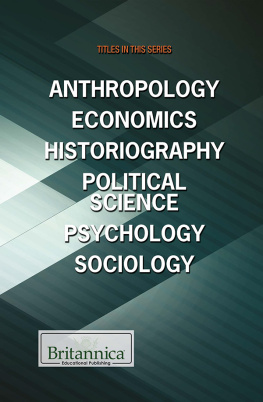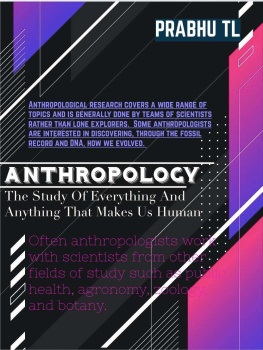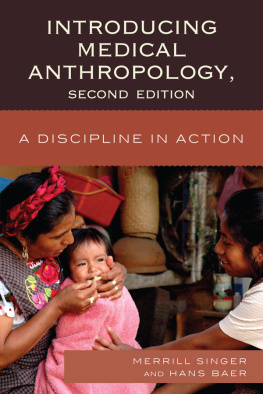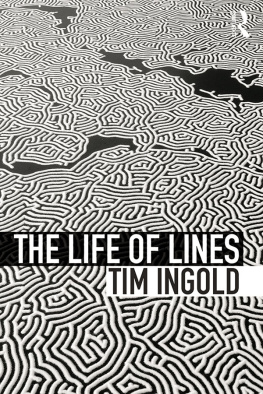Contents
Guide
Pages

Politys Why It Matters series
In these short and lively books, world-leading thinkers make the case for the importance of their subjects and aim to inspire a new generation of students.
Lynn Hunt, History
Tim Ingold, Anthropology
Neville Morley, Classics
Anthropology
Why It Matters
Tim Ingold
polity
Copyright Tim Ingold 2018
The right of Tim Ingold to be identified as Author of this Work has been asserted in accordance with the UK Copyright, Designs and Patents Act 1988.
First published in 2018 by Polity Press
Polity Press
65 Bridge Street
Cambridge CB2 1UR, UK
Polity Press
101 Station Landing
Suite 300
Medford, MA 02155, USA
All rights reserved. Except for the quotation of short passages for the purpose of criticism and review, no part of this publication may be reproduced, stored in a retrieval system or transmitted, in any form or by any means, electronic, mechanical, photocopying, recording or otherwise, without the prior permission of the publisher.
ISBN-13: 978-1-5095-1983-5
A catalogue record for this book is available from the British Library.
Library of Congress Cataloging-in-Publication Data
Names: Ingold, Tim, 1948- author.
Title: Anthropology: why it matters / Tim Ingold.
Description: Medford : Polity Press, [2018] | Series: Why it matters | Includes bibliographical references and index.
Identifiers: LCCN 2017057447 (print) | LCCN 2018001870 (ebook) | ISBN 9781509519835 (Epub) | ISBN 9781509519798 (hardback) | ISBN 9781509519804 (pbk.)
Subjects: LCSH: Anthropology--Philosophy. | Ethnology.
Classification: LCC GN345 (ebook) | LCC GN345 .I3726 2018 (print) | DDC 301.01--dc23
LC record available at https://lccn.loc.gov/2017057447
The publisher has used its best endeavours to ensure that the URLs for external websites referred to in this book are correct and active at the time of going to press. However, the publisher has no responsibility for the websites and can make no guarantee that a site will remain live or that the content is or will remain appropriate.
Every effort has been made to trace all copyright holders, but if any have been inadvertently overlooked the publisher will be pleased to include any necessary credits in any subsequent reprint or edition.
For further information on Polity, visit our website: politybooks.com
On Taking Others Seriously
How should we live? No doubt human beings have always pondered this question. Perhaps it is the very pondering that makes us human. For other animals, it seems, the question scarcely arises. Each is more or less absorbed in its own way of doing things. But human ways of life ways of doing and saying, thinking and knowing are not handed down on a plate; they are not pre-ordained, nor are they ever finally settled. Living is a matter of deciding how to live, and harbours at every moment the potential to branch in different directions, no one of which is any more normal or natural than any other. As paths are made by walking, so we have continually to improvise ways of life as we go along, breaking trails even as we follow the footsteps of predecessors. We do so, however, not in isolation but in the company of others. Like the strands of a rope, lives intertwine and overlap. They go along together and mutually respond to one another in alternating cycles of tension and resolution. No strand carries on for ever; thus as some pass away, others join. Thats why human life is social: it is the never-ending and collective process of figuring out how to live. Every way of life, then, represents a communal experiment in living. It is no more a solution to the problem of life than is the path a solution to the problem of how to reach a destination as yet unknown. But it is an approach to the problem.
Let us summon up a field of study that would take upon itself to learn from as wide a range of approaches as it can; one that would seek to bring to bear, on this problem of how to live, the wisdom and experience of all the worlds inhabitants, whatever their backgrounds, livelihoods, circumstances and places of abode. This is the field I advocate in these pages. I shall call it anthropology. It may not be anthropology as you might have imagined it, or even as it is practised by many of those who profess to be anthropologists. Conceptions and misconceptions of the discipline abound, and it would be tedious to review them all. I make no apology for presenting a personal view, coloured by my own career as a student and teacher in the subject, perhaps less of what anthropology is than of what I think it should aspire to be. Others may differ, but that would be a sign of vitality, not of weakness. For whatever else it may be, anthropology will always be a discipline-in-the-making: it can be no more finished than the social life with which it is concerned. Thus the history of anthropology cannot be told as a story from beginning to end. Nor can we rest on our laurels, as if to suppose that after centuries of error, ignorance and prejudice we have finally emerged into the light. There is work to be done, and this book is as much about remaking anthropology for the future as it is about retelling its past.
Now you might think that the problem of how to live really belongs to philosophy, and you would not be wrong. It is a problem, after all, that touches on the very foundations of human existence in this world of ours. We call ourselves human beings, but what does it mean to be human? The name science has given us, as a species, is Homo sapiens, but in what does our alleged sapience, or wisdom, consist? How do we know, think, imagine, perceive, act, remember, learn, converse in language and live with others in such distinctive and yet various ways? By what means, and on what principles, do we organize ourselves into societies, build institutions, administer justice, exercise power, commit acts of violence, relate to the environment, worship the gods, care for the sick, confront mortality, and so forth? These questions are endless, and philosophers have addressed them at length. So too have anthropologists. But heres the difference. Philosophers are reclusive souls, more inclined to turn inwards into a studious interrogation of the canonical texts of thinkers like themselves mostly, though not exclusively, dead white men than to engage directly with the messy realities of ordinary life. Anthropologists, to the contrary, do their philosophizing in the world. They study above all through a deep involvement in observation, conversation and participatory practice with the people among whom they choose to work. The choice depends on particularities of experience and interest, but in principle, they could be any people, anywhere. Anthropology, in my definition, is philosophy with the people in.
Never in human history has this kind of philosophy been more needed. Evidence that the world is at a tipping point is all around us, and overwhelming. With an estimated human population of 7.6 billion set to rise to more than 11 billion by the end of the century there are more of us than ever before, living on average for longer than ever before. More than half of the worlds population now resides in cities, most no longer drawing a livelihood directly from the land as their predecessors did. Supply chains for food and other produce criss-cross the globe. Forests are being laid waste, swathes of cultivable land have been turned over to soybean and palm-oil production, mining has gouged the earth. Human industry, above all the burning of fossil fuels on a massive scale, is affecting the worlds climate, increasing the probability of potentially catastrophic events, and in many regions shortages of water and other necessities of life have sparked genocidal conflicts. The world remains in the grip of a system of production, distribution and consumption that, while grotesquely enriching a few, has not only left countless millions of people surplus to requirements, condemned to chronic insecurity, poverty and disease, but also wreaked environmental destruction on an unprecedented scale, rendering many regions uninhabitable and clogging lands and oceans with indestructible and hazardous waste. These human impacts are irreversible and will likely outlast the tenure of our species on this planet. Not without reason have some declared the onset of a new era in the earths history: the Anthropocene.








